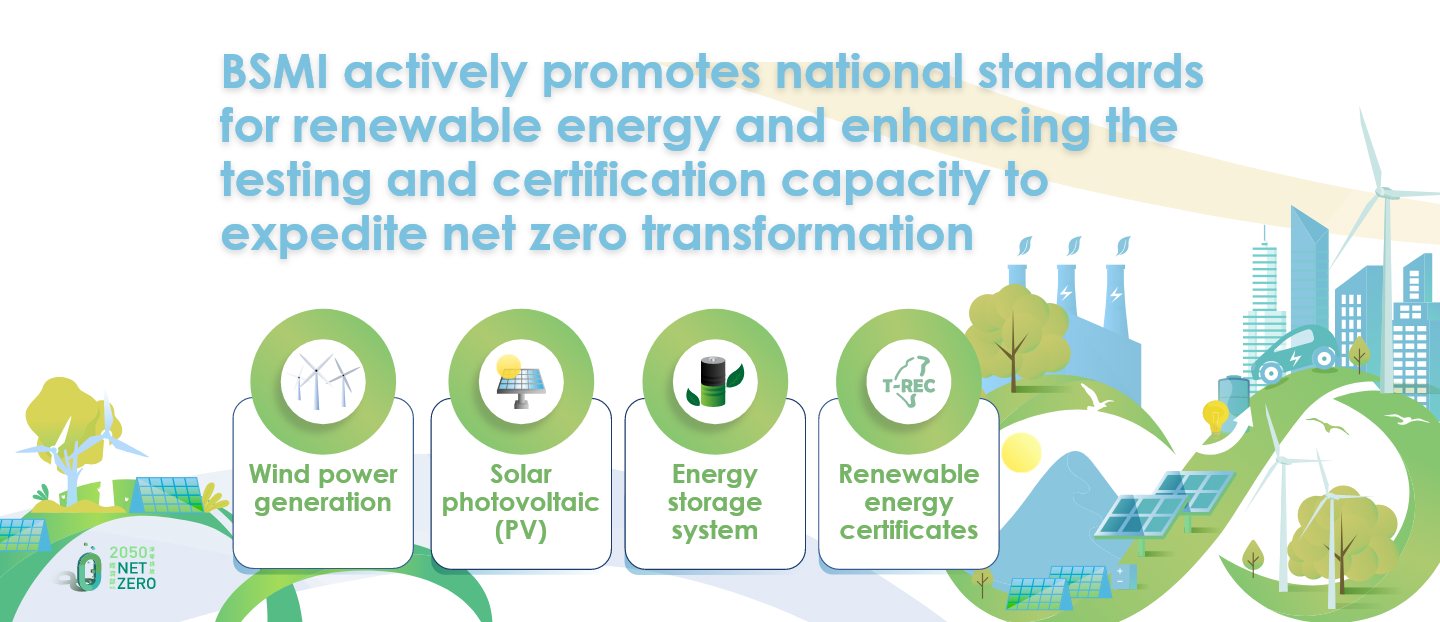BSMI actively promotes national standards for renewable energy and enhancing the testing and certification capacity to expedite net zero transformation
- Date:2024/01/17
- Hits:4517

The Bureau of Standards, Metrology and Inspection (BSMI) has been developing national standards for wind power generation, solar photovoltaics and energy storage systems to facilitate the growth and integration of renewable energy sources into the country's energy mix. These standards can be used by all stakeholders and substantively implemented via relevant testing and certification system. The number of national standards developed during the period of 2022-2023 doubled, with a total of 84 (45 in 2022 and 39 in 2023), from the year of 2021 when the "Taiwan 2050 Net Zero Emission Pathway" was adopted, to meet the needs of public applications.
BSMI pointed out that these standards help ensure safety, reliability, interoperability and efficiency in renewable energy systems. It also developed the following testing and certification systems based on these standards.
1.Wind power generation: Completion of the review and certification of 6 offshore wind power projects to ensure their compliance with requirements stated in the national standards and the strength of wind turbines in resisting high winds from typhoons and seismic activities from earthquakes.
2.Solar photovoltaic and energy storage system: An M(G)12 bifacial solar photovoltaic cell measurement system was built in 2023 to ensure the quality of solar photovoltaics, improve their power generation efficiency, and strengthen their stability to connect to the grid. In addition, the BSMI implemented the Voluntary Product Certification (VPC) program for outdoor battery energy storage systems (BESS) in November 2022. The certification is accepted by TaiPower Corporation for a BESS to participate in its regulation and frequency response service. 72 cases have been certified under the VPC program as of December 2023.
3.Renewable energy certificates (T-RECs): A number of measures have been adopted to streamline the process of purchasing T-RECs for SMEs, including green leasing projects, project on bidding green power released by TaiPower and transaction matching service. As of the end of November 2023, the cumulative scale of green power wheeling and transfer of T-RECs had exceeded 3 billion kWh (with the reduction of carbon dioxide reaching 1.51 million metric tons, which is approximately equivalent to the carbon absorption of 3,888 Daan Forest Parks in one year). There were 642 qualified T-RECs sites and more than 200 companies successfully purchased T-RECs.
The BSMI will continue implementing the national energy policies in line with international scientific and technological practices. It aims to build a standardizing environment that encompasses all aspects involving energy efficiency and carbon reduction. In particular, it will focus on developing and updating national standards in areas of hydrogen energy, biomass fuels, electric vehicles, environmental management systems and energy management systems in the coming years.
